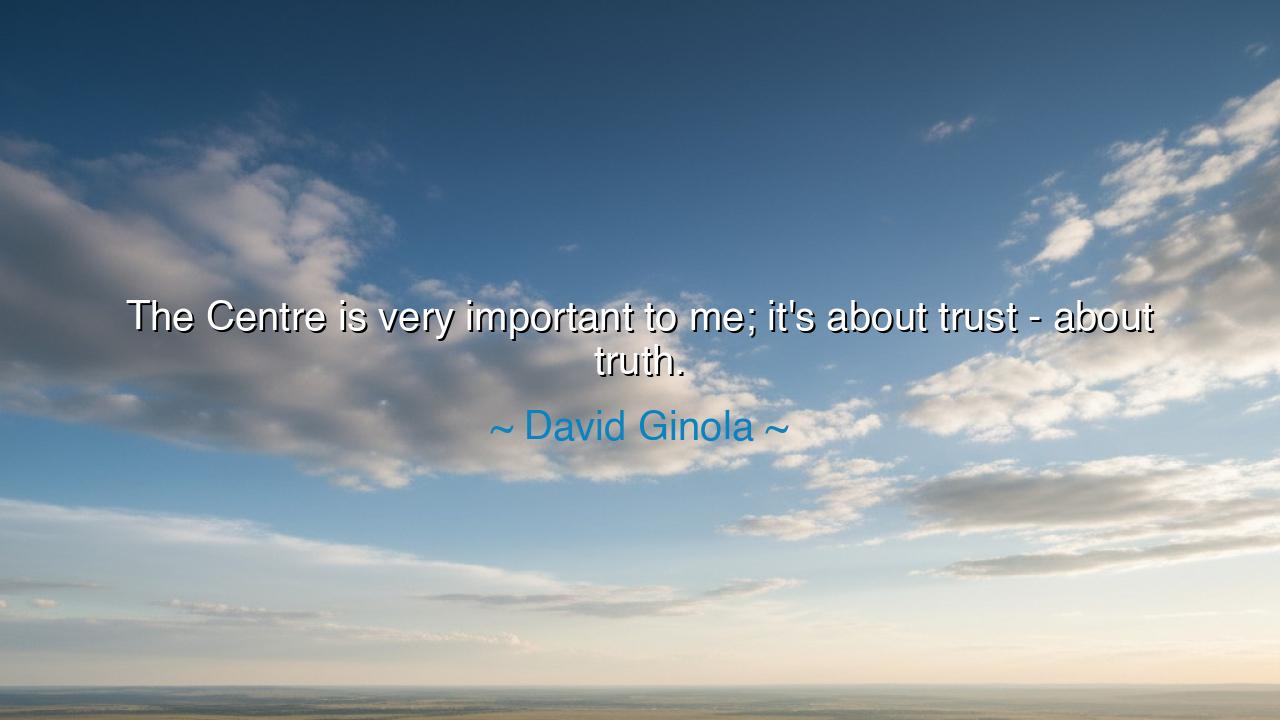
The Centre is very important to me; it's about trust - about






Hear the words of David Ginola, spoken not only as a footballer but as one who knew the deeper currents of human struggle: “The Centre is very important to me; it’s about trust — about truth.” At first, this may sound like a statement of sport, of tactics upon a field of play. Yet beneath the surface lies something far greater: a declaration of the eternal need for balance, for a centre in life, in heart, and in spirit. For the ancients knew well that to lose the centre is to drift into chaos, while to hold it firm is to live in harmony.
The centre is more than a position; it is a principle. On the field, it is the meeting place where attack and defense converge, where trust in one’s comrades is tested, and where the truth of a team’s strength is revealed. In life, it is the inner stillness, the core of the self, where a person stands rooted even when storms rage around them. Ginola, though speaking as an athlete, draws upon this universal wisdom: that without a centre, one is scattered; with it, one is whole.
Consider the story of Marcus Aurelius, emperor and philosopher. Surrounded by the tumults of war and betrayal, he often wrote to himself reminders to hold fast to his centre. In his Meditations he urged his own soul to return to reason, to balance, to truth, even when the empire itself seemed to falter. He knew that without this inner anchor, trust in himself and others would vanish. Like Ginola’s words, his life proclaimed: the centre is where trust and truth abide, and without it, both man and empire are lost.
Ginola himself understood trust in the heat of the game. To pass the ball into the centre was to believe a teammate would be there, ready to carry the play forward. It was an act of faith, a silent covenant between men striving for victory. So it is in all human endeavors: when we return to the centre of a relationship, a family, or a nation, we return to the ground of trust. Without that centre, all effort becomes scattered, and truth is replaced by suspicion.
And what of truth? The centre is its dwelling place. For in the centre, there is no excess, no distortion, no rush to the extremes. There is only the clarity of what is, not what we wish it to be. In politics, when rulers stray to the extremes, the people suffer; only by returning to the centre can justice and stability be restored. In personal life, when one strays too far into pride or despair, only by recalling the inner centre can one recover balance. Thus truth and centre are forever bound together.
The lesson here is luminous. Seek your centre each day, for it is the wellspring of trust and the ground of truth. Do not be drawn only by the noise of extremes, whether in thought, in action, or in the voices of the world. Return instead to that place within where honesty dwells, and from there, move outward with courage. Build your trust upon this centre, and others will find steadiness in you as well.
Therefore, take this as a practical way: in moments of confusion, pause, breathe deeply, and seek your centre before you act. In your dealings with others, speak from the centre, not from impulse or fear. In your goals, remember the centre is not weakness but strength, not indecision but clarity. In doing so, your life will echo the wisdom of Ginola’s words: The Centre is very important; it is about trust, it is about truth. To live in this way is to live with harmony, and to leave behind a legacy of balance that others may follow.






HLHai Le
I think Ginola’s words about trust and truth in the Centre speak to a broader idea of what it takes to maintain focus and integrity. In competitive environments, whether in sports or life, it’s easy to get lost in ambition and distractions. But how do we keep that centre intact? Can we ever really trust the process if we don’t believe in the fundamental truths that guide us?
ANQuynh Anh Nguyen
Ginola’s focus on the Centre as a place of trust and truth brings up an interesting idea about finding stability. In the context of sports, it may refer to staying grounded and true to one’s principles. But how does this concept apply to our personal lives? Can we always find balance, or do external pressures sometimes challenge the trust and truth we hold at the centre of our lives?
MMMon Min
This quote from Ginola seems to highlight the importance of a solid foundation, both in sports and in life. Trust and truth are powerful concepts, yet so often, we overlook how crucial they are to success. If the Centre represents this foundation, how can we ensure that we stay grounded in the values of trust and truth, especially when life or our goals seem to pull us in different directions?
LTNhat Linh Tran
David Ginola’s emphasis on the ‘Centre’ as a place of trust and truth is intriguing. It makes me think about how much we rely on balance in life—whether in sports, relationships, or even personal values. Trust and truth seem like the foundation of any meaningful interaction. How do we find the centre in our own lives, and how much does trust play a role in maintaining that balance?